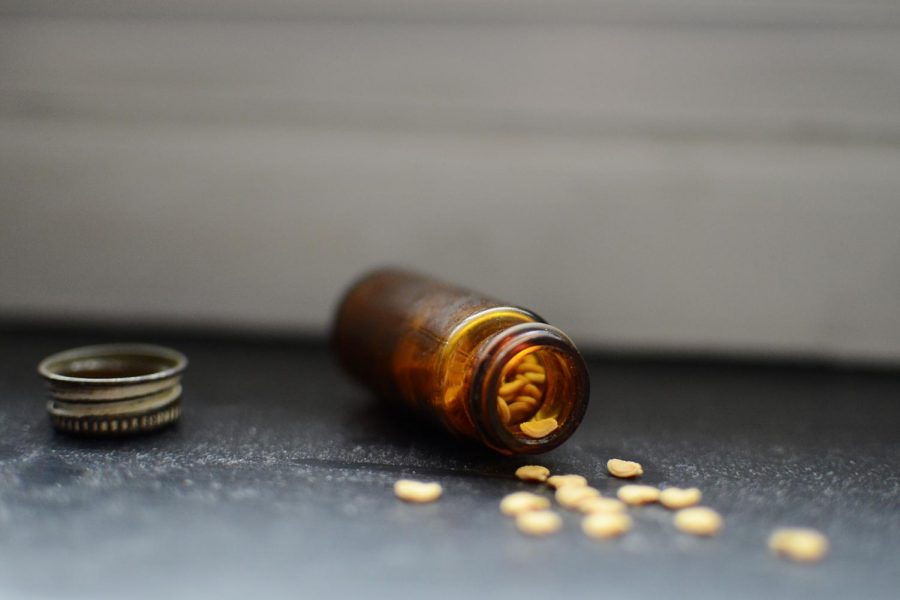Campus plant has psychedelic effects
October 30, 2014
Beyond the decorative appearance of an unusual plant lies a lethal poison, and it occasionally grows here on the Hill.
This plant is called Datura stramonium.
Martin Stone, associate professor of horticulture, said the plant is more commonly known as Jimsonweed. Martin said the name Jimsonweed derived from the Jamestown colony in Virginia.
He said during a period of starvation, the colonists would eat the plant and suffer from its psychoactive effects. These effects included prolonged visions, so colonists would seem possessed by the devil, Martin said.
“They thought they were crazy,” Martin said. “They thought the devil had possessed those people and so they would burn them at the stake or execute them. All they had done was eat the wrong thing.”
Martin said Datura stramonium affects the nervous system and it can be lethal in large doses.
“Keep in mind, that in every plant: it’s not the poison; it’s the dose,” Martin said.
Martin said the effects of Datura stramonium can last up to two weeks.
“It’s nothing to be messed with,” Martin said.
Bowling Green senior Laramie Stone is a student worker on WKU’s garden crew.
She said she has heard of cases where people have ingested the plant and under the influence, cut out their own tongue.
WKU’s garden crew has been working to get rid of the plant.
Josh Twardowski, campus services manager, said since he started in 2009, the crew has been working to eradicate the weed because it looks out of place in the landscape.
“The issue is that this plant is extremely invasive and re-seeds for years after a plant has been removed,” said Twardowksi.
Laramie said she has been working with the garden crew for a year and a half and she has seen around three plants.
“It’s just a random weed that shows up,” Laramie said.
Laramie said she has found the plant by the Health Services building.
Martin said Datura stramonium is in the nightshade family. He said this plant family includes tomatoes, eggplant and potatoes.
“The nightshade family, unless you know what you’re doing, you shouldn’t eat them,” Martin said. “The difference between having a psychedelic trip and dying, depending on the plant, is pretty thin.”
Martin said in Datura stramonium, the dosage of the poison varies from plant to plant.
“One plant could have five times as many psychoactive compounds as the other plant,” he said.
Martin said a smaller dose of the plant’s poison can cause visions. He said that the plant will sometimes be used in religious ceremonies for the vision effect.
Martin said there are several different ways to intake the plant for its psychedelic effects. He said people could smoke or beat the leaves or burn the shells to cause the contents of the seeds to leak out. The contents of the seeds can be rubbed across thin skin, such as the armpit or forehead, and passed into the bloodstream.
Martin said there are many cases every year where people misuse Datura stramonium thinking they will get high, but instead end up in the hospital.
Martin said Jimsonweed is an ornamental plant and could’ve been brought to campus accidentally for decoration. He, said, however, this isn’t the only poisonous plant on campus.
“Many, many plants are poisonous on the landscape on campus,” he said. “The red berries could kill a student. Plants are sometimes poisonous, this just happens to be one of them, but it’s also ornamental.”
Laramie said the plants that the garden crew has found have been around two feet tall.
“They can get big,” Laramie said. “They can get about six feet tall.”
Martin said the plant dies when the weather turns cold. However, he said the capsules on the plant can burst open and the seeds will sprawl out, causing the plant to come back when weather is warm. He said the seeds can spread through wind or people manually planting the seeds.
He said the plants are native to North America, but the plant has begun to spread all around the world.
“We think it’s been here for a long time,” Martin said. “It became more prominent with the help of humans.”
Laramie said it’s common to see the plant in pastures, but cattle seem to know not to eat the plant.
Martin said Datura stramonium is one of many ornamental plants that contain hallucinogenic effects. He said the most dangerous aspect of Datura stramonium is there is no way to regulate the dosage of poison when ingesting the plant.
“The difference between having a trip for recreation or a trip to the hospital is very, very small,” Martin said.


























